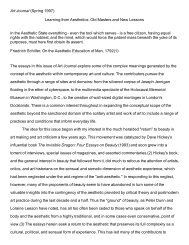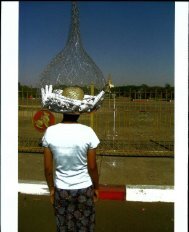Lessons in Futility: Francis Alÿs and the Legacy of ... - Grant Kester
Lessons in Futility: Francis Alÿs and the Legacy of ... - Grant Kester
Lessons in Futility: Francis Alÿs and the Legacy of ... - Grant Kester
You also want an ePaper? Increase the reach of your titles
YUMPU automatically turns print PDFs into web optimized ePapers that Google loves.
<strong>in</strong> place before <strong>the</strong> viewer, while <strong>the</strong> artist’s relationship to <strong>the</strong> viewer is<br />
necessarily distanced <strong>and</strong> custodial.<br />
This discourse typically operates through a juxtapositional logic <strong>in</strong> which a<br />
“good” form <strong>of</strong> subjectivity, def<strong>in</strong>ed as fluid, open, shift<strong>in</strong>g <strong>and</strong> <strong>in</strong>capable <strong>of</strong><br />
violence is contrasted with an anti<strong>the</strong>tical form <strong>of</strong> “bad” subjectivity, def<strong>in</strong>ed as<br />
fixed, closed, coherent, <strong>and</strong> violently <strong>in</strong>strumentaliz<strong>in</strong>g. It is l<strong>in</strong>ked, <strong>in</strong> turn, with<br />
debates <strong>in</strong> political <strong>the</strong>ory (e.g., Giorgio Agamben, Jean-Luc Nancy) over <strong>the</strong><br />
relationship between collective or communal identity (assumed to be<br />
always/already oppressive <strong>and</strong> universaliz<strong>in</strong>g) <strong>and</strong> a radical s<strong>in</strong>gularity that is<br />
seen as <strong>in</strong>tr<strong>in</strong>sically liberatory. Nancy’s writ<strong>in</strong>g is emblematic <strong>in</strong> this regard.<br />
Community, for Nancy, can only be ethically constituted if it arises <strong>in</strong> an <strong>in</strong>stant,<br />
<strong>in</strong> a moment <strong>of</strong> “unworked” epiphany. As soon as <strong>the</strong> experience <strong>of</strong> community<br />
<strong>in</strong>volves a durationally extended process <strong>of</strong> social exchange it descends <strong>in</strong>to<br />
mythic essentialism. Thus, Nancy’s ideal community is a “workless <strong>and</strong><br />
<strong>in</strong>operative activity. It is not a matter <strong>of</strong> mak<strong>in</strong>g, produc<strong>in</strong>g or <strong>in</strong>stitut<strong>in</strong>g a<br />
community” <strong>and</strong> “Community is given to us—or we are given <strong>and</strong> ab<strong>and</strong>oned to<br />
<strong>the</strong> community; a gift to be renewed <strong>and</strong> communicated, it is not a work to be<br />
done or produced.” 1 In his underst<strong>and</strong>able desire to foreclose <strong>the</strong> potential<br />
violence <strong>of</strong> direct, <strong>in</strong>ter-subjective exchange, Nancy reduces all human labour<br />
(“work,” “mak<strong>in</strong>g,” “production”) to a simple expression <strong>of</strong> conative aggression,<br />
function<strong>in</strong>g only to master <strong>and</strong> negate difference. The result is a fetishization <strong>of</strong><br />
simultaneity <strong>in</strong> aes<strong>the</strong>tic experience (<strong>the</strong> sublime, shock or disruption), <strong>and</strong> a<br />
2




